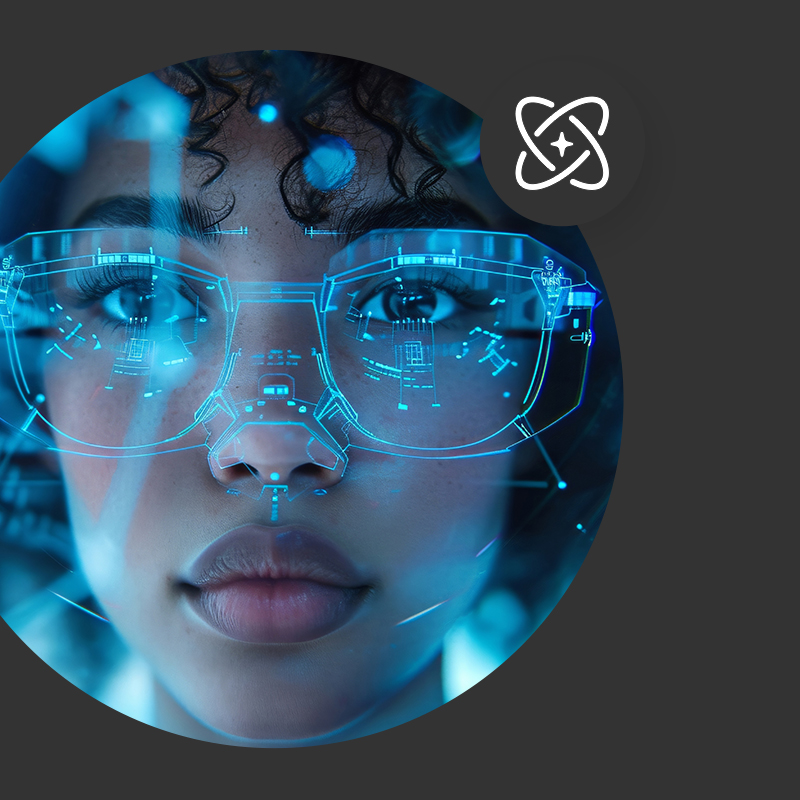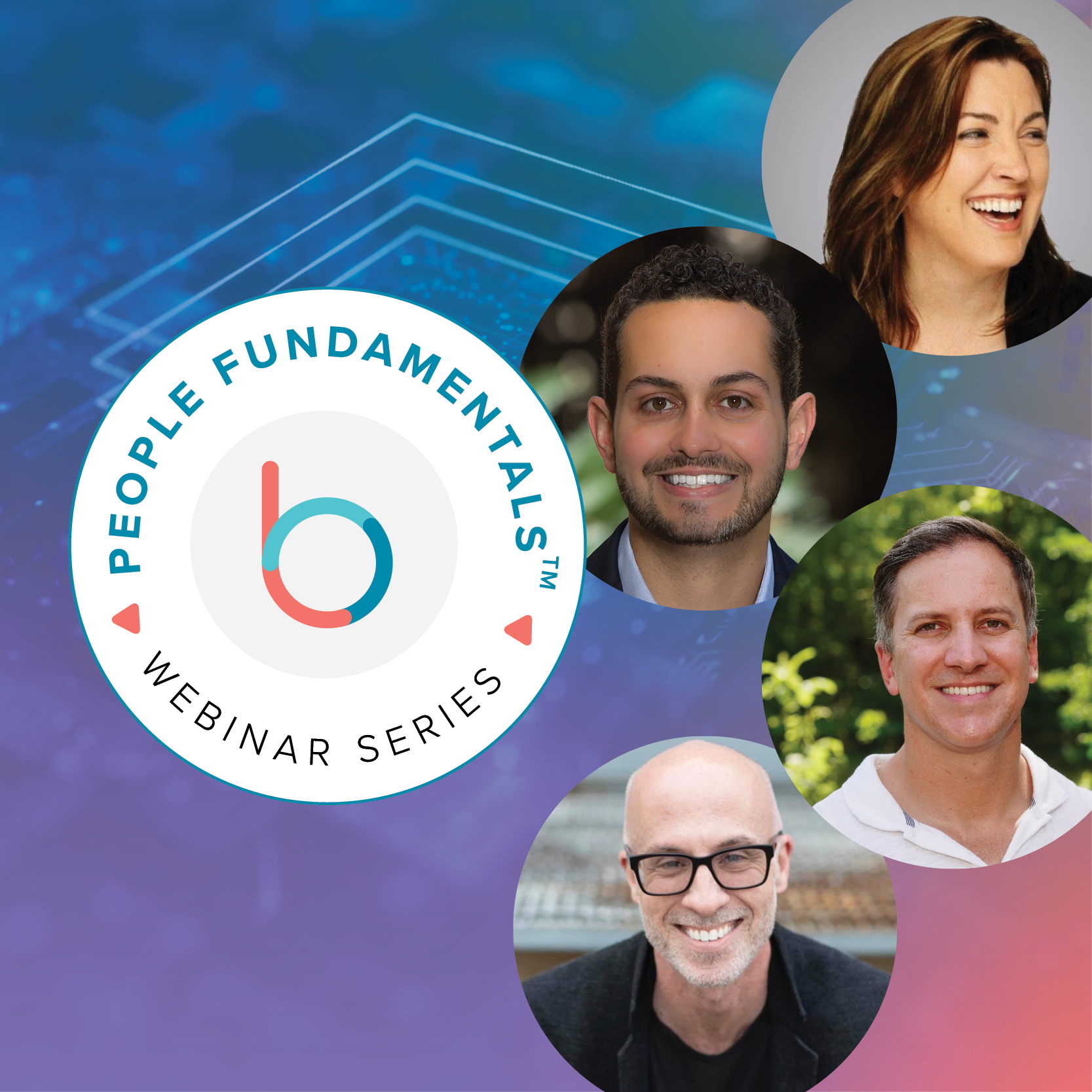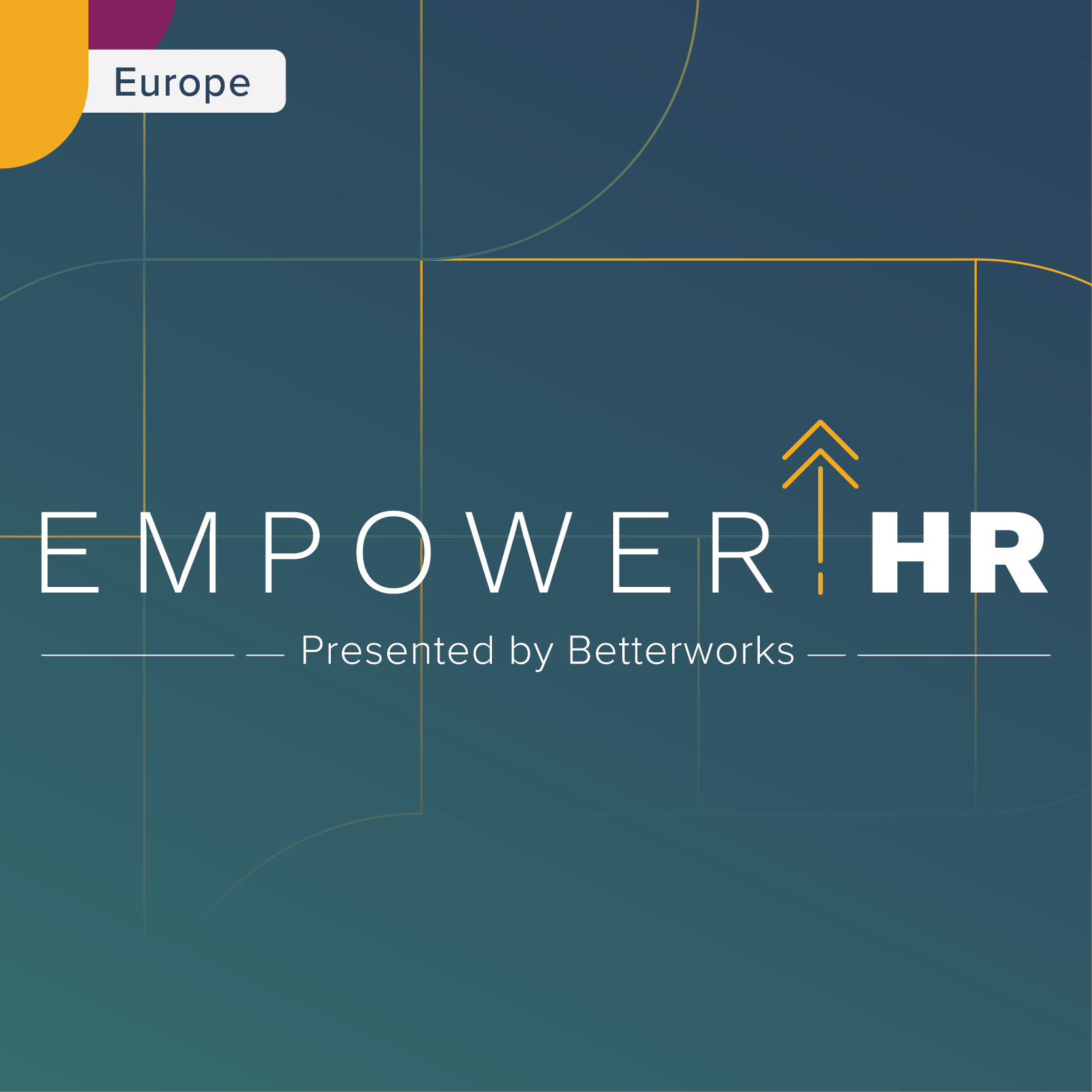By incorporating AI into your performance management, you can give your organization a competitive edge and keep your workforce engaged and productive.
The challenge of integrating AI into HR processes is top of mind for many HR leaders. “Everyone’s feeling the pressure and probably feeling a little behind the eight ball when it comes to AI adoption for themselves, AI adoption within their departments, and within their companies,” says Cheryl Johnson, chief product and technology officer at Betterworks. In fact, nearly half (41%) of the HR leaders we surveyed for our Generative AI Challenges and Opportunities report cited evaluating GenAI tools for HR processes as a top priority.
But adopting AI for performance reviews may not be as overwhelming as it seems, with many HR technology vendors doing a lot of the heavy lifting on the backend. “A lot of the power of GenAI is being brought to you, as an HR professional, through the technology that you already use,” Cheryl continues. “So you don’t necessarily have to do anything markedly different — other than be curious.”
Explore the transformative impact of AI on performance reviews, and discover practical advice for powering performance with AI in your organization.
What is AI’s impact on performance reviews?
AI is set to transform every element of the performance review process. GenAI’s ability to present data-based insights in accessible terms makes it easier for managers and employees to incorporate those insights into their daily conversations.
Learn about some of the ways you can use GenAI to improve your performance review processes.
Assessing goal completion
AI makes it much easier for managers and employees to keep track of goal completion. With AI tools, performance data is continually gathered and can be analyzed in real time, giving everyone a clear picture of how work is progressing. Managers can quickly see if employees are on track, falling behind, or exceeding expectations, which allows them to give timely and relevant feedback.
“There’s so much opportunity to bring more value to those conversations in the moment,” Cheryl says, “whether it’s nudging a manager, ‘Hey, you haven’t checked in on this goal that this employee is working on in some time,’ or maybe cheering them on for the progress they’re making.”
Employees, too, can see their progress and make any necessary adjustments to stay aligned with their goals. This real-time insight helps everyone stay on the same page and work more effectively toward their objectives.
Providing fair and actionable feedback
AI is changing how managers share performance feedback by making it more efficient, objective, and continuous. Managers can use AI to automate the process of gathering relevant performance data, generate performance summaries, and facilitate continuous feedback. For example, Betterworks uses AI to compile and summarize feedback from multiple sources, saving time and improving review quality.
GenAI also helps managers overcome the “blank page” problem so they can better express what they need to say to employees. “One way that we’ve seen a lot of adoption of GenAI is just with writing assistance — so really helping an individual get their thoughts out in a way that’s professional, unbiased, and going to achieve the goals that you want to achieve with giving that piece of feedback,” Cheryl says.
Instant feedback loops offer timely recognition and constructive feedback, helping employees understand their performance better and adapt quickly.
Fostering growth and development
With AI’s ability to process vast amounts of data in real-time, managers get detailed insights into team members’ performance trends and areas needing improvement, providing clear direction for employee development.
At a more strategic level, AI tools facilitate your overarching skills strategy. “What Betterworks is trying to do is use AI, and use our performance data, to help surface and assess what skills employees have,” says Ashley Litzenberger, senior director of product marketing at Betterworks. As managers and employees discuss skills development in your performance management platform, you can deploy AI to identify trends in the skills you need to build within the organization.
“You can start to shift to a more dynamic capture of what skills are critical for different roles,” Ashley continues. “That’s definitely part of the future of where skills are going, but we’re starting to lay the groundwork for that now.”
3 benefits of AI-enhanced performance reviews
AI is transforming performance review processes and outcomes by leveraging advanced data analysis and automation. This technological shift is redefining how organizations assess and enhance individual performance. The benefits of AI agents in this context are numerous, including improved feedback accuracy, enhanced user experience, and increased manager effectiveness. Find out how integrating AI paves the way for more dynamic and effective performance management.
Improve feedback accuracy
AI can improve the accuracy of performance feedback in a couple of key ways. For starters, AI tools can collect and interpret performance data in real time, giving managers a detailed and current view of an employee’s progress. This means feedback is based on solid data rather than just occasional observations, making it much more precise and relevant.
Additionally, AI can help reduce biases that can slip into performance reviews. It can spot patterns and highlight unconscious biases, helping managers provide fair and objective feedback. This not only promotes fairness but also builds trust in the performance review process. Employees are more likely to accept and act on feedback when they feel it’s accurate.
Enhance the user experience
AI can significantly enhance the performance review experience, addressing common points of resistance — especially how time-consuming it can be. “If you have a UX that’s easy for someone to use — if it’s helping them to write constructive feedback and make it more polished and professional using AI rewriting tools — you’re going to lower that barrier of resistance,” Ashley says.
Managers often struggle to find the time to compile and analyze all the data needed for a fair and comprehensive employee evaluation. AI assists by automating much of this process, gathering performance data in real time and generating insightful reports. This allows managers to spend less time on administrative tasks, and focus their efforts on meaningful conversations with their employees. It streamlines the process, making it more efficient and less daunting for everyone involved.
Additionally, employees can use AI to write self-evaluations, equipping them with talking points going into conversations with their managers so that discussions are productive.
Support manager effectiveness
AI tools can send timely reminders to managers, prompting them to provide regular feedback to their team members. These nudges help ensure that managers don’t overlook any critical follow-up actions, maintaining continuous communication and support. By automating these reminders, AI helps create a culture of consistent feedback, enhancing overall team performance and development.
Additionally, AI tools can analyze employees’ progress toward their goals and generate insightful questions for managers to ask during one-on-one meetings. Managers can tailor these questions to address specific areas of improvement or highlight achievements, fostering a more personalized and productive conversation. Because AI draws from historical data, such as goal progression and previous feedback left by the manager or peers, AI tools help managers bring context to performance check-ins.
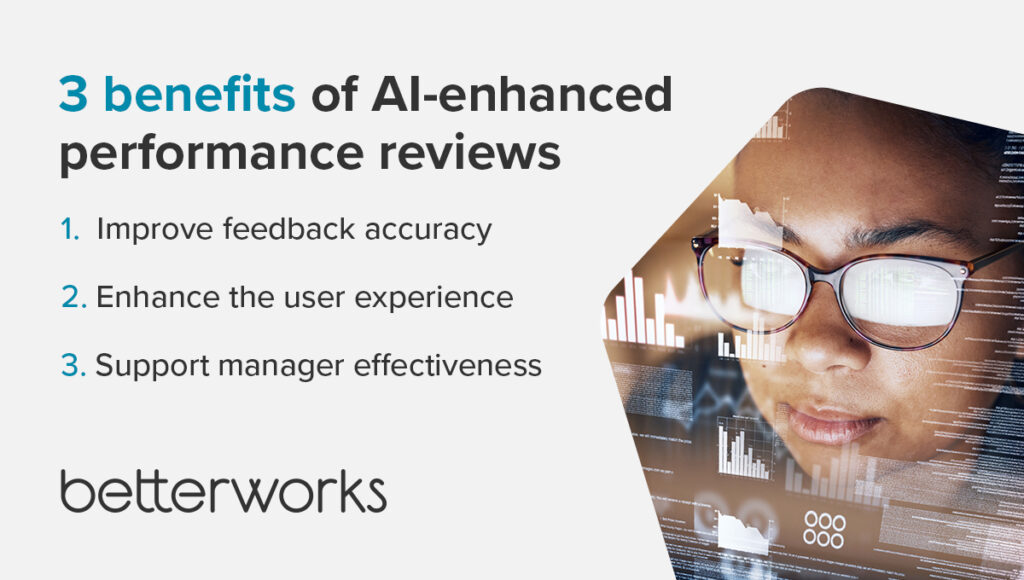
3 potential challenges of using AI to write performance reviews
While AI brings exciting advancements to performance reviews, it can also be a bit daunting for HR leaders who are still getting familiar with the technology.
“AI is still a really big unknown,” Ashley says. “And if you’re an HR leader, you are an expert in anything related to human resources, human relations, and workforce and talent management — but you are not an expert in AI, and that’s a little bit scary.”
Navigating these complexities requires thoughtful planning and strategy, but tackling these challenges is essential to fully reap the benefits of AI in performance management.
Protecting privacy and security
Open-source AI tools, like ChatGPT, have revolutionized how we approach work, usually for the better. But, while these tools can be incredibly powerful, they also come with the risk of exposing sensitive company information, Ashley says — especially if you don’t set ground rules for how to use them. More than half of employees we surveyed for our GenAI Challenges and Opportunities report admitted to using GenAI for work, whether your IT, security, legal, and HR teams approved its use or not.
Instead of relying on open-source AI tools, which may not have robust security measures, the best AI for writing performance reviews are secure, enterprise-grade AI solutions specifically designed for handling sensitive data. Betterworks, for example, conducts regular audits and continuous monitoring of its AI systems to identify and address any potential vulnerabilities early on, maintaining the integrity and security of client data. The company is also building its own internal LLMs, so sensitive data isn’t shared with third parties, which vastly reduces security risks and potential exposure of sensitive information.
Reducing bias
AI systems can inadvertently perpetuate existing biases present in their training data. Additionally, the complexity of AI models can make it difficult to understand and interpret their decisions, leading to concerns about fairness and transparency. More than half (57%) of respondents to our GenAI report are somewhat or very concerned that GenAI could intentionally introduce and perpetuate bias.
On the flip side, however, 72% of respondents think that GenAI can lead to fairer (objective and unbiased) performance evaluations, especially when it comes to removing age, gender, and racial biases. Make sure that AI systems are trained on diverse and representative data to minimize inherent biases. Regularly updating and auditing the training data can help maintain the fairness of the AI models.
Maintaining human oversight
Managers may be overwhelmed by the amount of information they receive, especially if they haven’t had enough training on how to interpret and use AI-generated insights. It can also be tempting to accept AI-generated insights at face value.
When managing generative AI in HR processes, you must ensure that both the data and the human perspective work together effectively. AI should act as an assistant to managers, not a replacement. It can help managers quickly and efficiently gather and summarize feedback, producing performance reviews or conversation points that are professional and unbiased. However, it’s crucial for managers to review and revise the AI output to check for errors or fill in gaps.
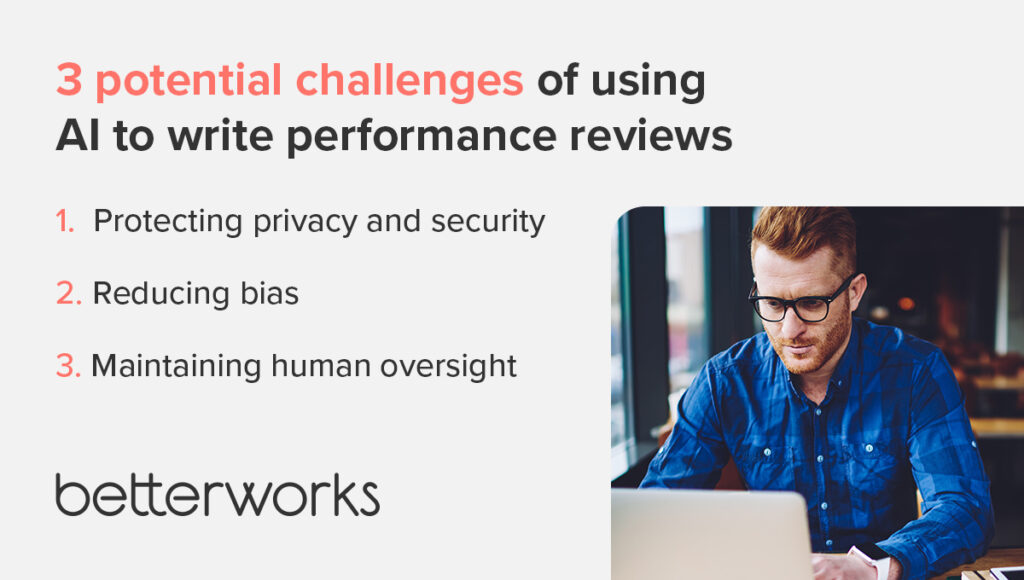
3 best practices for applying AI in performance reviews
When implemented effectively, using AI in performance reviews can boost the accuracy, efficiency, and fairness of evaluations. By adopting best practices, you can make sure this technology is used effectively and responsibly. Following these guidelines will help enhance your performance management processes and create a more productive and supportive work environment.
Balance artificial intelligence with human intelligence
While AI can offer valuable insights and make processes more efficient, it’s essential to keep a balance between AI and human judgment. In fact, 75% of employees we surveyed for our GenAI report responded positively to the idea of AI-generated performance reviews, as long as their manager reviewed and adjusted them for accuracy.
Let AI handle the data gathering and analysis, but make sure managers review and interpret the AI-generated reports. This human touch adds context to the feedback and considers factors that AI might overlook, creating a more nuanced and empathetic review process.
Communicate AI’s role in your performance management system
Talking to employees about how AI is used in performance reviews helps build trust and transparency. It can also ease any anxiety about the new technology and make sure everyone understands its role in the review process. When employees know how AI is being used, they’re more likely to accept and engage with the feedback process positively.
Offering educational sessions or workshops can help employees grasp AI’s benefits in making evaluations more accurate and fair. It’s also important to be transparent about your goals for implementing AI technology, its limitations, and the steps you’ve taken to protect data privacy and security.
Keeping everyone updated about any changes in AI usage helps maintain trust and engagement. By doing these things, you can make AI less intimidating and create a supportive environment where employees feel confident and comfortable with the new technology.
Provide ongoing training and support for using AI tools
Offering ongoing training and support for using AI tools is essential because it helps everyone stay up-to-date and comfortable with the technology. Continuous learning ensures employees and managers make the most of AI’s capabilities, leading to more accurate and fair performance reviews. Plus, it helps reduce any anxiety or resistance toward new tech.
You can achieve this by setting up regular training sessions and workshops that cover both the basics and advanced features of your AI tools. Include hands-on practice and real-life scenarios to make the training engaging and practical. Create a resource library with tutorials, FAQs, and guides that people can access anytime.
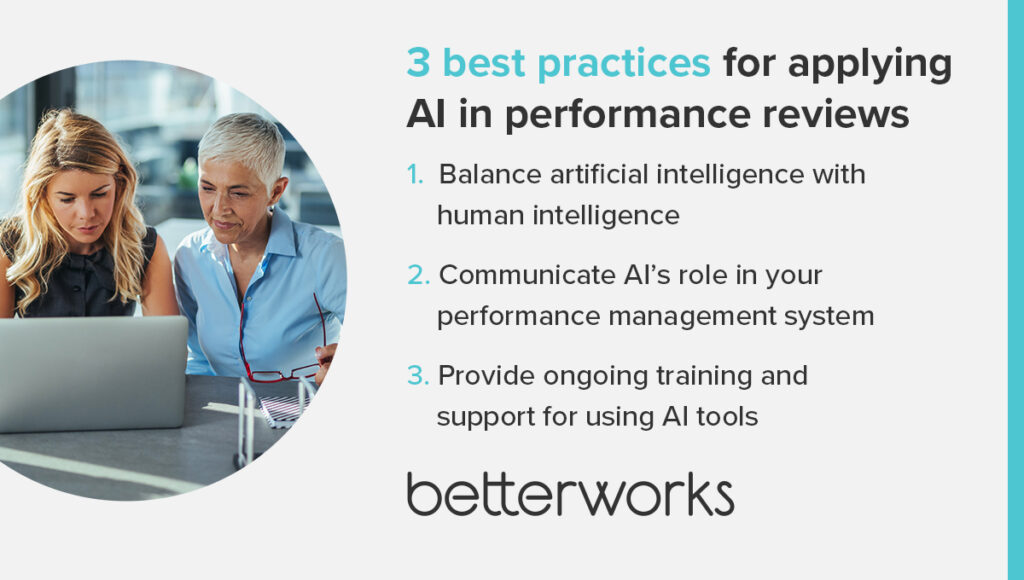
The future of performance reviews with AI
With the right approach, incorporating AI into your performance review process can significantly enhance how you evaluate and support your team. By providing ongoing training and ensuring a balance between AI and human judgment, you’ll create a more accurate, fair, and efficient review system.
Remember, the potential of AI is immense. It can transform your performance reviews into a continuous, data-driven process that benefits both managers and employees. So, don’t be afraid to get curious and experiment with the different AI options available in your tech stack. Embrace the possibilities, and you’ll find that AI can be a powerful ally in achieving better performance outcomes for your organization.
Want to learn more? Discover the evolution of performance management.
CEO’s take on AI in performance management



